I wrote the this essay in the week following the attacks. Never forget.
"Now We Understand"
Sunday, September 11, 2011
Thursday, August 25, 2011
"On the Waterfront" fitting conclusion to my summer of great films
 Image via WikipediaOn the Waterfront reminded me a lot of Casablanca. Not because of the plot, acting, etc., but because this film influenced so many others. It was more complex than I had thought, especially with the relationship between brothers Terry (Marlon Brando) and Charlie (Rod Steiger) Malloy.
Image via WikipediaOn the Waterfront reminded me a lot of Casablanca. Not because of the plot, acting, etc., but because this film influenced so many others. It was more complex than I had thought, especially with the relationship between brothers Terry (Marlon Brando) and Charlie (Rod Steiger) Malloy.Brando plays a washed up boxer who works on the docks and as muscle for the local mob boss Johnny Friendly (Lee J. Cobb). His brother Charlie is Johnny's right hand man. Terry unwittingly helps Johnny get rid of a dock worker who was preparing to go to the police, but when Terry begins to fall in love with the victim's sister Edie (played by Eva Marie Saint), complications ensue. You could teach a great lesson on internal and external conflict using this film.
As someone who had only seen Brando in his later films, I finally understood why he earned the reputation as a screen legend. Every "tough guy with a heart of gold" draws his inspiration from Brando's portrayal of Terry Malloy.
 Image via WikipediaEven more impressive for me was Karl Malden (left) as the street wise parish priest Father Barry. He's able to bridge the gap between Terry and Edie. Fans of Streets of San Francisco will be amazed.
Image via WikipediaEven more impressive for me was Karl Malden (left) as the street wise parish priest Father Barry. He's able to bridge the gap between Terry and Edie. Fans of Streets of San Francisco will be amazed.I wasn't very impressed with Saint's Edie. I didn't really feel the chemistry between her and Brando.
The powerful final scene caps off a well deserved ranking of number 19 in AFI's Top 100.
School begins again next week, so this will probably be it for my AFI summer. I watched 10 of the films on the list - not bad.
Saturday, August 06, 2011
"The Last Picture Show" turns 1950's upside down
I think the highlight for me was the stylized direction of Peter Bogdanovich. The sense of desolation and loneliness from the opening shot of the main street in town sets the perfect tone for the film. As someone who was only familiar with Cybill Shepherd from Moonlighting, she was a revelation here as the sexually manipulative Jacy Farrow. Timothy Bottoms continually blank expression might seem as poor acting in some films, but his expressionless performance was perfect for the blank Texas small town he lives in. Jeff Bridges looked a bit old to play a teen, but plays the roughneck well.
The shock value of some of the scenes was enhanced by the choice to film in black and white. The lack of color enhances the overall "lack" of anything worthwhile in the town. With nothing to do and nowhere to go, the characters make the best of what they have and find love where they can. Well, not quite love, but companionship. One such character is the wife of the school basketball coach. Ruth Popper (Cloris Leachman) combats her loneliness and depression by "seducing" Bottoms's character Sonny Crawford. I don't know if seduced is the right word. She's looking for anything to give her an excuse to wake up in the morning and he's looking for something to relieve the boredom. As the first love scene unfolded, I found myself ready to look away lest I catch a glimpse of Leachman naked. It was pitiful to watch her weep as Sonny was on top of her. That scene has to be one of the most uncomfortable love scenes in movie history.
The gut wrenching final scene unifies the film and reinforces the desolation and loneliness which pervades it. Much of this film reminded me of American Graffiti - characters deciding whether they will get away or make a stand in their small town.
 Image via WikipediaThe Last Picture Show deserves much higher than #95 for its groundbreaking subject matter and stylistic direction. I may even give its sequel, Texasville (1990), a try.
Image via WikipediaThe Last Picture Show deserves much higher than #95 for its groundbreaking subject matter and stylistic direction. I may even give its sequel, Texasville (1990), a try. Next up: On the Waterfront
Tuesday, July 26, 2011
"Sunset Blvd." deserves spot in the sweet sixteen
 Image via Wikipedia Image via Wikipedia |
| "I'm ready for my close-up, Mr. DeMille." |
William Holden plays the down-on-his-luck Hollywood writer Joe Gillis who, while avoiding the repo men, blows a car tire and drives into what he thinks is the driveway of an abandoned Sunset Blvd. mansion. Much to his surprise, he discovers that the mansion is occupied by faded silent film star Norma Desmond (Gloria Swanson). Desmond has written a script for her "return" to film and hires Joe to polish it. Joe can't believe his luck but soon discovers that things are not quite what they seem.
I love the plot, but I have one small quibble: revealing the ending at the beginning of the film. I suppose that it was unique in the 50's, but by now it seems cliche. I'm also not a big fan of first person narration, which figures prominently in the film, but on the "Making of" featurette, Wilder explained that he loved narration because it allowed him to put a lot of exposition in a short amount of time and it allowed him to make social commentary on what was happening in the film. Looking back on the film, the narration does seem to fit that purpose.
Swanson won the Oscar for her performance, and deservedly so. Desmond is one creepy character. Holden shows Gillis's conflicted heart well. I like the performance of Nancy Olson as Betty Schaefer, the aspiring writer who falls for Gillis. She's a perfect foil for Desmond - fresh, wholesome and lovable.
Next up: either The Last Picture Show or On the Waterfront, which ever one comes in to the library first.
 Image via Wikipedia
Image via WikipediaThursday, July 14, 2011
"Singin' in the Rain" showcases Kelly, but not much else
 Image via WikipediaAs I continue to work my way through the films I have not seen in the AFI Top 100, Singin' in the Rain (#5) was the highest rated on the list. I understand that the singing and dancing was something special, but as far as musicals go, this one would not be at the top of my list. For my money, White Christmas would be at the top of my musical list.
Image via WikipediaAs I continue to work my way through the films I have not seen in the AFI Top 100, Singin' in the Rain (#5) was the highest rated on the list. I understand that the singing and dancing was something special, but as far as musicals go, this one would not be at the top of my list. For my money, White Christmas would be at the top of my musical list.To me, Singin' in the Rain is a star vehicle for Gene Kelly and not much else. Debbie Reynolds is underused and the buddy relationship between Kelly's character and Donald O'Connor's (Cosmo Brown) never materializes. Both O'Connor and Reynolds get too little screen time compared to the annoying Lina Lamont, played well by Jean Hagen.
One thing this film shares with White Christmas is the EXTREMELY long dance sequence which essentially serves as intermission. Perhaps it's just because I'm not into dance, but to drag the number out for (what seems like) ten minutes is painful. The "Singin' in the Rain" dance number is just long enough to hold my interest and make me appreciate Kelly's talent, but the "Gotta Dance" marathon drove me to get a snack.
Needless to say, this one didn't do it for me. For it to be #5, and White Christmas not to appear at all is just plain wrong.
 Image via Wikipedia Image via Wikipedia |
| Gloria Swanson in Sunset Blvd. |
Thursday, July 07, 2011
Snappy dialogue and strong performances dominate "All About Eve"
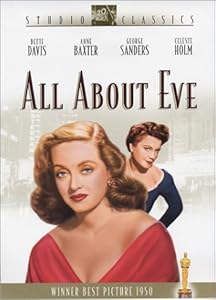 Cover via AmazonAs my summer tour of the AFI top 100 continues, watching 1950's All About Eve (#16 on the list) was one of the most enjoyable experiences so far. It still holds the record (now tied with Titanic) for most Oscar nominations, and I can see why.
Cover via AmazonAs my summer tour of the AFI top 100 continues, watching 1950's All About Eve (#16 on the list) was one of the most enjoyable experiences so far. It still holds the record (now tied with Titanic) for most Oscar nominations, and I can see why.Both female leads - Betty Davis as Margo and Anne Baxter as Eve - are excellent, but neither won the Oscar. They split the "Best Actress" vote. If Baxter had submitted her name as "Best Supporting Actress", they probably would have both won. The only acting prize for this film went to George Sanders as the manipulative theater critic Addison DeWitt. He was great to watch and looked like he was enjoying every minute of his role. He even got to be one of the first actors to appear with one Marilyn Monroe on screen as she makes her major debut in this film.
Davis's performance as the insecure aging stage legend looked like a lot of fun to play as well. The script was fantastic as it revealed Eve's scheming graduallly. There was very little action in this film, so the dialogue had to carry the audience's interest and it did so beautifully.This might be heretical to some, but the snappy dialogue reminded me of the television shows "Cheers" and "Moonlighting."
Even though Margo is the ultimate theater diva, we see just enough of her vulnerability to feel sorry for her as people (knowingly and unknowingly) scheme against her. Even though she didn't win the Oscar, her performance is better remembered than the one which won (Gloria Swanson in Sunset Boulevard).
Of the films I've seen so far this summer, All About Eve and The Apartment have been the best. At #16, I'd say Eve deserves her top 20 status.

Tuesday, July 05, 2011
"Double Indemnity" shows off early American film noir
Fred MacMurray plays a cynical insurance agent who sees an opportunity to bilk the company he works for and run away with a frustrated housewife, played by Barbara Stanwyck.
For movie buffs, the film noir effects are all in play - the lighting, the use of shadow, the cynical characters. MacMurray's Walter Neff is pretty unscrupulous considering the time period. He cheats his company, hits on a married woman and later conspires to kill her husband - talk about an antihero! As the unfaithful, murderous wife, Stanwyck doesn't quite do it for me. She doesn't have that touch of evil she needs to convince the viewer she can go through with the plot.
One plot line I would have liked to have been explored further was the relationship between Neff and Lola, the step daughter of Stanwyck's character. Lola comes to Neff (who sold her father the insurance policy) to accuse her step mother of murder. Neff tries to steer her from that suspicion and gradually develops a relationship with the girl. If the film was made in the 21th Century, I'm sure that love triangle would have been more developed. Neff does the right thing with her, and it's about the only noble thing he does in the whole film.
At #29 on the AFT top 100, Double Indemnity ranks with Chinatown as the two film noir entries in the top 30. Considering that it was one of the groundbreakers of that genre, I think it deserves that high a placement.
Next up: All About Eve (1950)

Sunday, July 03, 2011
Songs for an Alternative 4th of July
We were at a baseball game (Nashua Silver Knights) and listened to the same old patriotic songs. If I was running the show, here are some alternatives I'd play:
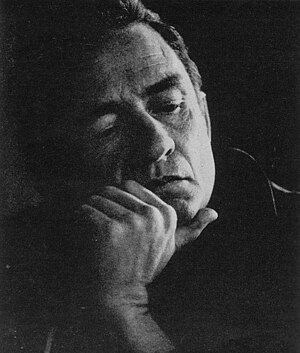 Image via Wikipedia
Image via Wikipedia

- For those of you who understand that "Born in the USA" is NOT a patriotic song, try this one Bruce wrote after 9/11 -
 Image via Wikipedia"The Rising"
Image via Wikipedia"The Rising" - Instead of "God Bless America", how about the song Woody Guthrie wrote in response to it - "This Land is Your Land"?
- While we're on protest singers, how about Bob Dylan's "Chimes of Freedom"?
- For a more traditional song, try Ray Charles's version of "America the Beautiful".
- When someone criticizes the President and suffers because of it, here's the proper way to respond - Dixie Chicks "Not Ready to Make Nice". Here's to the power of the freedom of speech.
- Why this one isn't played more this weekend, I don't know. Might be the only rock song with the word "patriot" in it.- Little Steven "I Am a Patriot"
- The Man in Black goes patriotic - "Ragged Old Flag"
- You might think "R.O.C.K. in the USA" should be the choice here, but Melloncamp's "Small Town" has a more patriotic feel to it.
- Even the biggest cynic has to get misty with this one - SSgt. Barry Sadler, "Ballad of the Green Berets"
- Don't need to explain this one - "4th of July" by X
 Image via Wikipedia
Image via Wikipedia 
Thursday, June 30, 2011
"Creepyness" pervades "Cabaret", but timelessness does not
As my son and I watched the beginning of Cabaret (1972), number 63 on AFI's top 100, he got his first look at Joel Gray as the Master of Ceremonies.
"He's creepy looking." he said.
From the mouths of babes (well, at 12 he's not exactly a babe). As I continued to watch (he wandered off to his PS3 shortly after the first scene), his words crept (pun intended) back into my mind. There is a "creepy" nature to this film. Some of it was intended, some of it not.
It's creepy to watch as the decadent, amoral, disaffected Berliners stumble through life which almost makes one understand how the Nazis were able to rise to power so quickly.
It's creepy to watch Sally Bowles (Liza Minelli) delude herself into thinking that her father or her German sugar daddy will ever REALLY care for her.
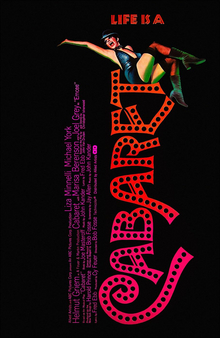 Image via WikipediaIt's creepy to watch Brian Roberts (Michael York) battle his internal conflict between his love for Sally and his lust for Max, Sally's sugar daddy.
Image via WikipediaIt's creepy to watch Brian Roberts (Michael York) battle his internal conflict between his love for Sally and his lust for Max, Sally's sugar daddy.
I did like the directing and editing. Most musicals work the numbers into the plot, which always seems unrealistic to me. Cabaret, however, uses the frame of the cabaret show to tell the story and connects the musical numbers with the plot instead of integrating them. The Master of Ceremonies dances with a gorilla while singing "If You Could See Her", a song seemingly about looking for the inner beauty in a person. It's a wonderful song until the end when he mentions that she's "a Jew." Suddenly, the racist tones of the song connect with the rising antisemitism in Germany and the developing relationship between Fritz and Natalia. One scene consists of quick cuts between the laughing decadence of the Kit Kat Club and the brutal beating of the club's owner by a pack of Nazis. The juxtaposition of those images sends a strong message.
I suppose some of the material in the film (pre-marital sex, bisexuality) may have been a bit shocking for the time it was made, but that part doesn't hold up well over time. The look into the rise of the Nazis and the frivolity of love between insecure characters holds up better.
I suppose for sheer shock value at the time, it would warrant #63, but I judge a classic by its timeless nature. Cabaret doesn't quite meet that standard.
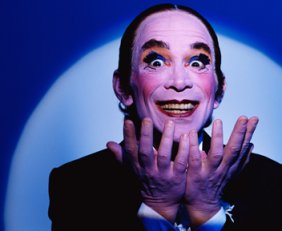 |
| Joel Grey as the Master of Ceremonies |
From the mouths of babes (well, at 12 he's not exactly a babe). As I continued to watch (he wandered off to his PS3 shortly after the first scene), his words crept (pun intended) back into my mind. There is a "creepy" nature to this film. Some of it was intended, some of it not.
It's creepy to watch as the decadent, amoral, disaffected Berliners stumble through life which almost makes one understand how the Nazis were able to rise to power so quickly.
It's creepy to watch Sally Bowles (Liza Minelli) delude herself into thinking that her father or her German sugar daddy will ever REALLY care for her.
 Image via WikipediaIt's creepy to watch Brian Roberts (Michael York) battle his internal conflict between his love for Sally and his lust for Max, Sally's sugar daddy.
Image via WikipediaIt's creepy to watch Brian Roberts (Michael York) battle his internal conflict between his love for Sally and his lust for Max, Sally's sugar daddy.I did like the directing and editing. Most musicals work the numbers into the plot, which always seems unrealistic to me. Cabaret, however, uses the frame of the cabaret show to tell the story and connects the musical numbers with the plot instead of integrating them. The Master of Ceremonies dances with a gorilla while singing "If You Could See Her", a song seemingly about looking for the inner beauty in a person. It's a wonderful song until the end when he mentions that she's "a Jew." Suddenly, the racist tones of the song connect with the rising antisemitism in Germany and the developing relationship between Fritz and Natalia. One scene consists of quick cuts between the laughing decadence of the Kit Kat Club and the brutal beating of the club's owner by a pack of Nazis. The juxtaposition of those images sends a strong message.
I suppose some of the material in the film (pre-marital sex, bisexuality) may have been a bit shocking for the time it was made, but that part doesn't hold up well over time. The look into the rise of the Nazis and the frivolity of love between insecure characters holds up better.
I suppose for sheer shock value at the time, it would warrant #63, but I judge a classic by its timeless nature. Cabaret doesn't quite meet that standard.
Saturday, June 25, 2011
"The Apartment" belongs in the high-rent district
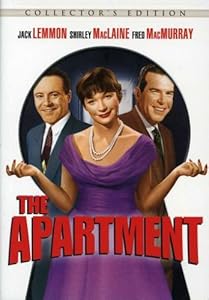 Cover of The Apartment (Collector's Edition)Number 80 on AFI's top 100 list is The Apartment (1960). I think it should be higher. It's a great romantic comedy in the old school tradition (i.e. no gratuitous nudity or language - in fact none at all). It features great writing (Academy Award for Best Screenplay) and acting, with excellent performances by Jack Lemmon and a young Shirley MacLaine.
Cover of The Apartment (Collector's Edition)Number 80 on AFI's top 100 list is The Apartment (1960). I think it should be higher. It's a great romantic comedy in the old school tradition (i.e. no gratuitous nudity or language - in fact none at all). It features great writing (Academy Award for Best Screenplay) and acting, with excellent performances by Jack Lemmon and a young Shirley MacLaine.For me, McLaine is the revelation here. I had never seen any of her earlier films and was only familiar with her later work and her zany reincarnation beliefs. As the crux of the love triangle with C.C. Baxter (Lemmon) and Sheldrake (Fred MacMurray), MacLaine's Fran plays an elevator operator in a large insurance firm. She trades quips with the horny male workers and fends off the gropes of older management types. She balances a self-confident exterior with an inner vulnerability which makes the character very interesting.
Baxter moons over her, but he has a problem - he loans out his nearby apartment to the management at his company for illicit trysts in order to advance up the corporate ladder. He spends so much time juggling the "schedule" for his apartment that he can't work up the nerve to tell Fran how he really feels. The big boss (MacMurray) finds out about the apartment and offers Baxter a promotion for exclusive access. Guess who he wants to bring there?
With the current nostalgia for the early 60's (see Mad Men), I'm surprised there hasn't been a remake of this film. The writing would stand out in today's rom-com fluff. Steve Carrell would do the Baxter role justice, and Alec Baldwin would devour the Sheldrake role.
As one of the few comedies to win Best Picture (1961), The Apartment should upgraded to a higher rent district by the AFI.
Next up on the list, we continue with the Billy Wilder-Fred MacMurray duo and investigate Double Indemnity (1944).
Monday, June 20, 2011
Enjoyable voyage on "The African Queen"
 Cover via AmazonThe African Queen -- John Huston's take on the "river journey" film, still holds up today, as both an adventure and a romance.
Cover via AmazonThe African Queen -- John Huston's take on the "river journey" film, still holds up today, as both an adventure and a romance.I found myself comparing this, unfairly of course, to Casablanca because of Bogart and his battle with the Germans (different war, I know). His character is much different, though. Rick Blaine would have tossed Rosie (Katharine Hepburn's character) over the side of the boat within 10 minutes. Charlie submits to Rosie's will early and often and she dominates the pair for most of the film.
The scene where they "consummate" their relationship shows how much things have changed in Hollywood since the 50's. They kiss passionately (no tongue, of course) and the scene dissolves. Fade in to the morning with Charlie sleeping and Rose smiling down on him preparing to serve him breakfast in bed. I'm sure feminists would have a field day with that. If the film was remade today, we would have seen the boat rockin' on the river and perhaps some startled wildlife. Clothing would have been strewn all over the Queen.
The ending was a bit contrived for my taste, but that was the way of it during that time period. Shakespeare would have been proud of the extreme coincidence of the final scene. All's well that ends well, I suppose.
The African Queen is ranked number 65 by the AFI, and I think it's appropriate. It influenced many films which followed (Romancing the Stone for one). If you watch Raiders of the Lost Ark, you can see the relationship between Indy and Marion has Charlie and Rosie's fingerprints all over it.
My next film will be The Apartment (1960) -- #80 on the list.
Sunday, June 12, 2011
Thoughts on "Raging Bull"
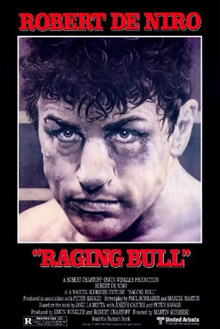 Image via WikipediaIt wasn't next from the bottom of the AFI 100, but I happened to notice it at the library, and, having just watched The Fighter, I grabbed Raging Bull. I'm glad I did.
Image via WikipediaIt wasn't next from the bottom of the AFI 100, but I happened to notice it at the library, and, having just watched The Fighter, I grabbed Raging Bull. I'm glad I did.At number four on the list, it was the highest rated film I had yet to see. I love Scorcese anyway, and he didn't disappoint.
De Niro and Pesci were as advertised, but I thought Cathy Moriarty stole many of the scenes in the film. In a way, her character (LaMotta's second wife, Vikki) is the strongest in the film. She doesn't back down from LaMotta's verbal abuse and gives as good as she takes. The black and white of the film really highlights her blonde hair and fair skin and works as a great contrast with De Niro's dark hair.
Raging Bull fits all the qualities of the classic Greek tragedy. LaMotta reaches great heights but is brought down by his own tragic flaw. Some see his temper as the flaw, but it's his paranoia - constantly suspecting his wife of cheating and his brother and the local mafia of conspiring to swindle him. It eventually drives him to brutally attack his brother and destroy their relationship. He eventually goes on to win the title, but it seems hollow because his brother is not by his side.
Martin Scorcese highlights LaMotta's struggle against being controlled by the mafia, but later shows how he succumbs and throws a fight just to get a shot at the title. His tearful breakdown in the locker room after the Hill fight could almost be considered the climax of the film, even though he had yet to win the title. He takes great pride in not having been knocked down in the ring, but his integrity suffers a deadly blow. He doesn't realize he's already lost everything he fought for.
After that, it's downhill for the character even though his career has yet to peak. Everyone he's loved abandons him, and he's left, in the end, talking to himself in a mirror - a fitting narcissistic ending for the character.
As for number four on the top 100, I think that's a bit high, but it should certainly be in the discussion.
Thoughts on "Ben-Hur"
 Image via WikipediaOne down, many to go. As epics go, it fit the bill, but even at 3+ hours, there were holes in the film that bothered me. He goes to Rome, and all of a sudden he's this expert chariot racer? Up to that point in the film, he hadn't even seen a horse! More back story on the friendship between Judah and Messala would have been nice as well. It seemed that William Wyler (the director) was obsessed with the "epic-ness" of the film and skimped on character development.
Image via WikipediaOne down, many to go. As epics go, it fit the bill, but even at 3+ hours, there were holes in the film that bothered me. He goes to Rome, and all of a sudden he's this expert chariot racer? Up to that point in the film, he hadn't even seen a horse! More back story on the friendship between Judah and Messala would have been nice as well. It seemed that William Wyler (the director) was obsessed with the "epic-ness" of the film and skimped on character development.I have to say, Charlton Heston can overact with the best of them. Between Ben-Hur and The Ten Commandments, I've seen enough of his overwrought grimaces to last me for a while. The similarities between the two films and the characters he plays (a Jew, treated like a prince, befriends an enemy of his people, exiled...etc.) make you scratch your head.
The cinematography was fantastic and, in today's CGI world, the live action chariot race was amazing. The score was what you would expect from this type of story.
As an epic, it doesn't rank with Lawrence of Arabia, but it kept me interested. I'd say it's rank in the AFI Top 100 is warranted, but just barely so.
Next up: Raging Bull (1980)
Tuesday, May 31, 2011
Summer goal
So the summer is almost upon us, and I've decided on my goal. It won't cost anything (which is good in my case), and it should give me some motivation for writing in my blog.
 I'm going to try to view as many of the AFI (American Film Institue) Top 100 films as I can. I'm going to borrow them from the local library, so I won't have to buy/rent them.
I'm going to try to view as many of the AFI (American Film Institue) Top 100 films as I can. I'm going to borrow them from the local library, so I won't have to buy/rent them.
I'm a movie geek, so I've seen many of them already. I'm going to concentrate on the ones I have not seen, starting from the bottom and working my way to the top.
My first feature is number 100: Ben Hur (1959). I've always considered The Ten Commandments as one of my guilty pleasures, so I'm looking forward to Charlton Heston in another sword and sandals epic. I've put a hold on the four disc re-release. If I'm true to my word, I'll share my thoughts on the film in a few days.
 I'm going to try to view as many of the AFI (American Film Institue) Top 100 films as I can. I'm going to borrow them from the local library, so I won't have to buy/rent them.
I'm going to try to view as many of the AFI (American Film Institue) Top 100 films as I can. I'm going to borrow them from the local library, so I won't have to buy/rent them.I'm a movie geek, so I've seen many of them already. I'm going to concentrate on the ones I have not seen, starting from the bottom and working my way to the top.
My first feature is number 100: Ben Hur (1959). I've always considered The Ten Commandments as one of my guilty pleasures, so I'm looking forward to Charlton Heston in another sword and sandals epic. I've put a hold on the four disc re-release. If I'm true to my word, I'll share my thoughts on the film in a few days.
Subscribe to:
Posts (Atom)








